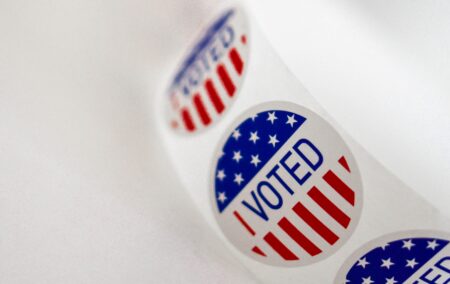Surely there must be a better voting system than this? Many people must have asked this question as they watched the messy vote-counting for the 2020 US Presidential Election (still not complete at the time of writing).
I am going to propose a better, simpler, fairer, quicker system, and then express some doubts about it. The present system, devised in the 18th Century, is this: The head of state of the USA is chosen in a separate election from Congress and the Senate. Every adult citizen has one vote. The votes are collected in each state. The votes do not go directly to the presidential candidate but to electors in an electoral college in each state. The number of electors is proportional to the state population.
When the popular voting is over, the electors vote for the president. They are legally entitled to vote for a different candidate from the one the people chose, but hardly ever do so. In all but two states (Maine and Nebraska), the candidate with most votes gets all the electors. California, with the biggest population, has 55 electors. If 50.1% of its vote were Democrat and 49.9% Republican, the Democrat would get all 55 electors, the Republican none.
It is possible for a candidate to win the presidency on electoral votes despite having fewer popular votes. Trump won like this in 2016. Of course, if he had known that the popular votes would decide the winner, he would have campaigned differently, and might have become president on the popular vote. (He would have campaigned in California, which he didn’t do, because he knew he couldn’t win the state, but he could have won more votes there, pushing up his national total.)
Cumbersome, unfair
The present system is cumbersome and unfair, I think, and made worse by different methods and times of voting. Voting may be on paper, by post, by machine, by electronic method and by scanning, and it may be on the day or beforehand, sometimes long beforehand.
Here is what I propose. The president should be elected directly on one popular national vote. All voting should be electronic, with voters going to a voting machine in a booth. Portable machines should be taken to houses and hospitals for people unable to travel. People away from home on the day should be allowed to vote elsewhere provided they show proof of citizenship. With limited exception, all voting should happen in one day.
Computers are advancing at astonishing speed, reliability and price. Electronic security systems are getting better and better. The code-makers are advancing faster than the code-breakers. If some crook gets into your banking system, it is not because he has broken your code but because he has tricked you into revealing it to him. Electronic money is more secure than a paper cheque. Electronic voting would be more secure than voting on paper, let alone voting by post.
Ten minutes after the final voting station had closed, the result could be announced, and all the votes publicly displayed.
Carefully considered
Here are some of my doubts about my proposal, all carefully considered in 1787 by the Founding Fathers, surely one of the wisest groups of politicians ever assembled. (The staggering success of the USA must be largely attributed to their wonderful, if not perfect, Constitution.) One of their reasons for not choosing the president by a national popular vote was poor communications over a very large country. That reason has gone. Another was a wish for geographical distribution of voting power.
For me, that doesn’t apply for the election of the head of state. A more serious concern was that they didn’t altogether trust the wisdom of the common man, and thought political decisions should be entrusted to people who know better. This somewhat snobbish attitude is shared by nearly all of us. That is why we should be against a referendum on the death penalty: we know that the coarse masses like a good hanging, but we superior people don’t. The Founding Fathers thought the ordinary people should vote for an elector, a man of superior wisdom, and he would vote for the president.
More serious still was their fear of the mob, which might bring ‘tumult and disorder’. This is justified. The mob is a dangerous and mad thing. One crowd of a thousand humans is very different from a thousand individual humans. It is not even human; it is sub-human.
Biggest concern
The Founding Fathers were fearful of the president being elected by a mob, and so put the barrier of the electoral college between the masses and the president. But this, their biggest concern, doesn’t seem to hold true anymore, with people usually dispersed into small groups, watching politics on electronic screens or reading it in newspapers. At least, I don’t think so.
So I’m for one popular electronic vote. That would have saved us the horrible mess we are seeing right now.
The views of the writer are not necessarily the views of the Daily Friend or the IRR
If you like what you have just read, support the Daily Friend

